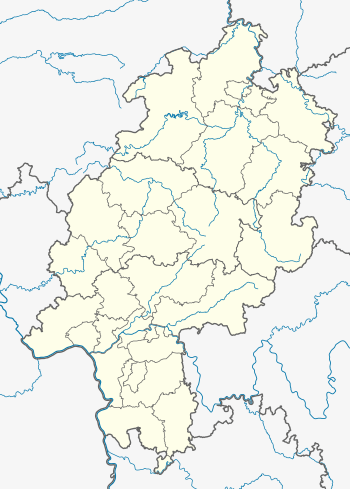Morschen
Morschen is a community in the Schwalm-Eder district in Hesse, Germany.
Morschen | |
|---|---|
 Coat of arms | |
Location of Morschen within Schwalm-Eder-Kreis district   | |
 Morschen  Morschen | |
| Coordinates: 51°03′N 09°36′E | |
| Country | Germany |
| State | Hesse |
| Admin. region | Kassel |
| District | Schwalm-Eder-Kreis |
| Government | |
| • Mayor | Herbert Wohlgemuth |
| Area | |
| • Total | 47.94 km2 (18.51 sq mi) |
| Elevation | 201 m (659 ft) |
| Population (2018-12-31)[1] | |
| • Total | 3,231 |
| • Density | 67/km2 (170/sq mi) |
| Time zone | CET/CEST (UTC+1/+2) |
| Postal codes | 34326 |
| Dialling codes | 05664 |
| Vehicle registration | HR |
| Website | www.morschen.de |
Geography
Location
Morschen lies in the Fulda valley south of Kassel.
Constituent communities
The community consists of the centres of Altmorschen (administrative seat), Binsförth, Eubach, Heina, Konnefeld, Neumorschen and Wichte.
Politics
Culture and sightseeing
Buildings
Kloster Haydau, a former Cistercian convent, was built between the mid 13th century and the early 14th century, and in the mid 16th century and 17th century it was converted into a stately home for a Landgrave. Today, the building is used for meetings and conventions, as a gallery, a meeting place for professors, and a venue for poetry readings.
Economy and infrastructure
Personalities
Honorary citizens
- 1997 – Gottfried Kiesow, German memorial protector.
gollark: α and β radiation are very easy to block, I think the main issue is just accidentally consuming some of the radioactive stuff.
gollark: Are there not problems with random people having a large enough mass of radioisotopes to cook things?
gollark: The *UK* Queen? Oh bee.
gollark: Also heights, for some weird reason.
gollark: Oh, I see.
References
- "Bevölkerungsstand am 31.12.2018". Hessisches Statistisches Landesamt (in German). July 2019.
External links
- Official website

This article is issued from Wikipedia. The text is licensed under Creative Commons - Attribution - Sharealike. Additional terms may apply for the media files.